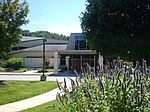Har Sinai Congregation ("Mount Sinai Congregation") is a Reform Jewish synagogue located in Owings Mills, Maryland. Originally established in 1842 in Baltimore, it is the oldest congregation in the United States that has used a Reform prayer rite since its inception.
Many of the original congregants of Har Sinai Congregation came from what was then the Orthodox Jewish Congregation Nidchei Yisroel (later known as the Baltimore Hebrew Congregation), after Rabbi Abraham Rice protested against the performance of Masonic rites at the funeral service of one of its members. The synagogue was originally known as the Har Sinai Verein (Society).Rabbi David Philipson, in his 1907 work The Reform Movement in Judaism, credited Har Sinai as "the first congregation organized as a reformed congregation" when it was established in 1842. The synagogue adopted the prayer book formulated by the Hamburg Temple, the first reform synagogue in Germany, and services were led by the members. Abram Hutzler, founder of the business that became the progenitor of Hutzler's department store and whose father, Moses Hutzler was a co-founder of the temple, described Har Sinai's earliest practices as "almost orthodox, with covered heads, the separation of the sexes, and the use of 'a Shabbos goy' to light the fires." Later, as part of the congregation's rituals, services were conducted in both Hebrew and English, music was played, and women participated together with men. The first prayer services were held in May 1842 at the residence of Moses Hutzler on Exeter Street and Eastern Avenue, which was above the store that operated on the ground floor. "In 1849, the Congregation built its own temple on High Street in Baltimore and acquired a cemetery."
The synagogue purchased a 17-acre (69,000 m2) property in the northwestern neighborhood of Park Heights from the Maryland Country Club, with a new synagogue dedicated in 1938. A $1 million fundraising program was begun in 1953 by Rabbi Abraham Shusterman. A design modeled on Cleveland's Park Synagogue was created, and following groundbreaking in September 1957, the new structure, the Congregation's fourth home, with seating for 600 and able to accommodate 2,200 for High Holy Days services, was first used in June 1959. During the 1950s, Shusterman was a regular panelist on the weekly television program To Promote Goodwill, an interfaith discussion of social and religious issues by clergy representing Jewish, Catholic, and Protestant views, produced by WBAL-TV and broadcast worldwide on the Voice of America. Owings Mills was chosen as the site of a satellite Hebrew school in 1988 and a 60,000-square-foot (5,600 m2) structure was completed there in 2002.






